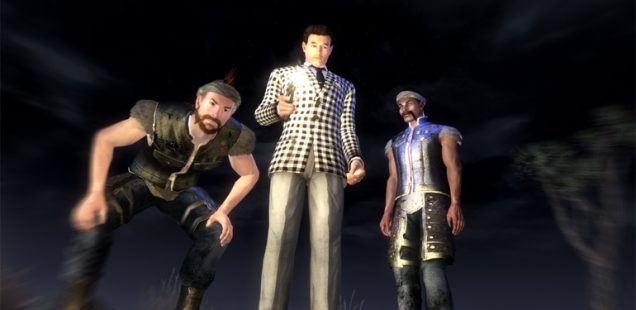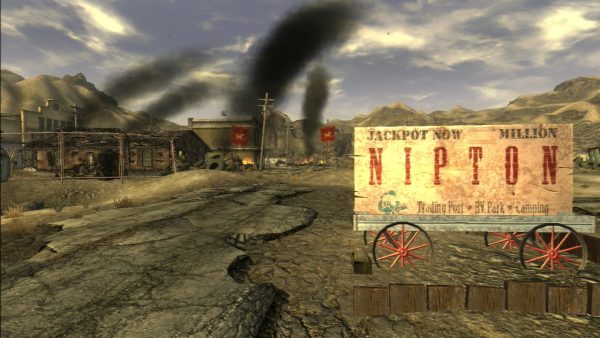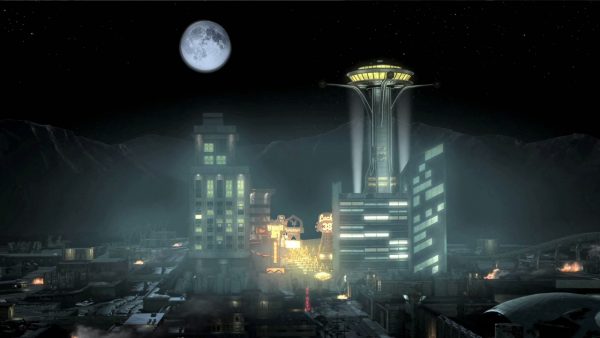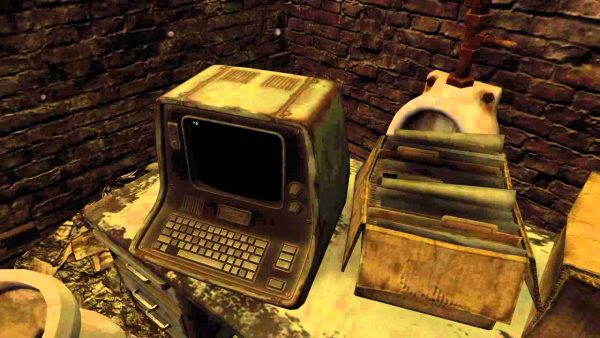
Due Diligence: Capital and Waste
Leigh Harrison speaks for the lost.
“I won the fucking lottery! Yeeeaaahhh! Fu-cking lo-tte-ry!” At first I reckon the jubilation is coming from the sandy hill in front of me, but then I think better of it. Hills don’t have mouths. They only have eyes.
A little further up the track I come upon the true source of the enthusiasm: a man by the name of Oliver Swanick. His wild eyes look me over as he fidgets with a slip of paper, passing it from one hand to the other as if it were a deliciously hot baked potato, the kind of food we used to think commonplace before the bombs fell some 200 years ago. He explains to me that a few days prior Caesar’s Legion invaded nearby Nipton, a small town a few miles due south of the New Vegas Strip, and held its citizens hostage, forcing them to partake in a lottery for their lives.
Oliver was the lucky recipient of the winning ticket and set free, sent into the merciless desert heat with only the shirt on his back for protection. But even with odds like that he feels lucky. Everyone else in town has been sodomized, crucified, burned alive, or all three—though not necessarily in that order. Hard right-wingers who model themselves on the aesthetics and brutality of the Roman Empire, Caesar’s Legion aren’t known to do things by half. Their reason for decimating the populace of Nipton? The town is a cesspit of depravity and debauchery, and needed cleansing.
I’m well acquainted with the place and its longstanding reputation, thanks to long-lost colleagues and friends who joined the armed forces. Owing to their meagre allowance of a week’s leave twice a year, military types get awfully excited by things we civilians take for granted, gleefully inundating their Pip-Boy friends with photographs of literally everything they do. They’re very much like people with children in this respect.
Scarcely a week goes by without a gun-toting acquaintance showing me pictures of beers, craps, or the crusty innards of a prostitute’s drawers, and while a part of me is overjoyed at their levity, I’m mainly annoyed on their behalf that they’ve become so easily impressed. I’ve seen people stopping by Nipton for their quota of blood, sex, and booze for the last 11 years, and beyond the low, low prices, there really isn’t anything worth celebrating, especially publicly.
I’ve witnessed, from a safe distance, the town grow from a tiny brahmin farm into the glorious temple of vice that it is today. But to hear people talk you’d think Nipton had existed for all of eternity. Oliver tells me he was attracted here by the fables, too. “All you can drink and all you can eat, if you see where I’m coming from?! Yessir, there’s something for everyone!” He’s excited, he tells me, by a secondhand secondhand story of how a friend’s cousin’s grandmommy came here in the ‘20s to run a motel, until one day she met a charming suitor who whisked her away to The Strip on a wing and a prayer and a sack full of stolen caps, where they spent their final, fugitive days together at The Tops casino sipping cocktails and frittering away their ill-gotten gains.

None of this happened, of course. As I say, Nipton has only been Nipton for a little over a decade, so any of this having taken place here all those years ago would be impossible. I don’t say any of this to Oliver. There’s be no point. History is warped in these postwar days, and doesn’t work like it used to before the war of 2077, not that my young companion would understand. And besides, he’s already bidding me farewell and heading to The Strip in search of his destiny, just like that friend’s cousin’s apocryphal grandmommy.
It’s the same all over the Wasteland though, and I must say it’s one of my favorite aspects of inhabiting the fictional universe of Fallout: New Vegas. In the real world, where I actually live, the human species is bogged down in ineffectual tradition and historicism, cursed to dwell on the mistakes of its past while it nonetheless repeats them wholesale. Whereas in the Wasteland, history, at least as we perceive it today, doesn’t really exist. The Great Khans’ leader, Papa Khan, tells me of their storied 14 years terrorizing the Mohave. The New California Republic have been here 20. The Strip itself was a ghost town less than a decade ago, before Mr House turned the power back on and got the roulette wheels turning again. The Mojave desert, where New Vegas takes place, has no history. In a world where you’re lucky to make it to 50, where books stoke fires and not imaginations, where pens are used as makeshift weapons or intravenous delivery systems, these narratives, these dubious oral histories, are all most people have.
A couple of weeks after meeting Oliver Swanick, my travels take me back to Red Rock Canyon, where I once again sit by the fire with Papa Khan and listen to his people’s tale. His chest puffs to near bursting as he tells me of their early days in the Mojave, when they mercilessly ambushed NCR migrants and Crimson Caravan shipments, making off with the lives and possessions of anyone unlucky enough to cross their path. He was a young man back then, and the years and the desert haven’t been kind. Battered by sandstorms and the unrelenting sun, his face is as hard and leathery as a brahmin’s hind quarters. Coarse, graying hair covers a good half of it, while what’s left exposed to the elements is dominated by the deep, scornful brow guarding his hate-filled eyes. His once muscular frame is now gaunt and strained, scarred by countless battles and hardships, some inflicted and some self-imposed. He’s running on fumes.
Ever since the massacre at the Bitter Springs three years back, when the NCR indiscriminately shot and killed Khan men, women and children, Papa Khan and his people have done nothing more than eke out a life and let their hatred almost consume them. Their numbers so decimated they have no hope of reprisal against the NCR, instead they slowly wither at Red Rock with only malice and memories of better days.
But what of the distant past, before the Mojave? Papa Khan has nothing to say. His story only spans the 14 years since his group came to the desert. The 30-odd he spent out west are there somewhere, locked away in his head. But they’ll die along with him, leaving only half-truths and empty spaces in their wake. This is how the Wasteland came to be a place founded on myths and hearsay, where any knowledge of the past is only skin deep, and any position in history is transient at best.

Contrast this with our world, where certain hallowed institutions are immovable in time. Investment banks and insurance providers, staffed by coke-addled, self-serving, functioning alcoholics, selling incomprehensible financial products designed to make me look ignorant and ill-informed—I don’t need the help, thanks—are “too big to fail”, and so soak up government money like the towels their employees clean up their murderous drug binges with. God forbid we acknowledge that neoliberal free market capitalism mightn’t be worth saving to begin with.
We’re so sold on this story that we’re even inclined to publicly weep when mechanisms of the regime fail, as was the case when two outmoded UK retailers, Woolworths and HMV, breathed their last, staked through the heart by their own customers’ slovenliness and avarice. Brick and mortar stores are great in theory, and we love to celebrate their decades of dutiful service and our fictitious unwavering patronage, but they don’t stand a chance against online retailers and the apathy of the buying public. We mightn’t shop there anymore, but we still like having them around. They remind us we’re human. And the retailers themselves feed off this, mistaking our comforting nostalgia as a sign that they’re still, in any way, relevant to our lives.
It’s been a week since I sat with Papa Khan, and I’m in New Vegas for some R&R. “Yessir, there’s something for everyone!” That voice ringing out from the nearby storefront is instantly familiar. Oliver Swanick has miraculously made it to The Strip, but, less miraculously, hasn’t found his fortune here. Instead, he’s working at the Mojave’s only branch of GameStop. I walk in and our eyes meet. He’s trapped behind the counter at the back of the store, sweating profusely and looking far worse than when I saw him last. “We can’t talk here,” he whispers to me, terrified, “meet me in Freeside after I get off and I’ll let you buy me a drink.”
“I won the fucking lottery, man, and here I am schilling for GameStop. The business model just doesn’t work anymore, which is why they’ve this ‘Circle of Life’ bullshit. Basically, we all have these key performance indicators—KPIs—which are about selling add-ons so the business can make money, because just selling videogames in a brick and mortar store isn’t profitable anymore. Customers—we have to insipidly call them ‘guests’—come in and want to buy a game, right, but the thing is we don’t make any caps from new games. So to hit our targets we have to sell loads of pre-orders, PowerUp Reward cards, and used games, as well as promote customer trade-ins. If we don’t, we’re out. We all have to convince customers—sorry, guests—to buy things they don’t want or need just to keep our jobs. I used to live in Nipton, ‘the Devil’s vag’, and even I find this morally questionable. I’m probably getting fired next week as well. Wooh! Fuck it, I’m going to bed. Let yourself out.”
I myself once worked work for the consumer electronics purveyor Currys, and can fully appreciate the horror of target-driven retail employment. Towards the end of my tenure—when I chose to jump down the stairs before I was pushed—I regularly failed to achieve any of my 10 monthly KPIs. TVs had to be sold with mounting brackets, installation, and fraudulently expensive cables; laptops with a bag, antivirus, and cloud backup; cameras with a bag and SD card; and everything had to be sold on credit and with insurance. Strike down anyone who failed to meet the 50–80% conversion rate on any of these targets: that meant you were bad at your job and would soon be relieved of it.

Bestowed from up on high by flabby executives working tirelessly to maintain an outmoded business, these targets were impossible to achieve. The branch in north east London where I worked, which was so viable it closed down five years ago as Currys contracted under its own looming fiscal insignificance, wasn’t a place brimming with sales opportunities. It was largely frequented by immigrants from eastern Europe and the Indian subcontinent, few of whom, through no fault of their own, could afford to fund the business on profit-rich add-ons. But management were deaf to this: we had to meet our targets and upsell add-ons, and they didn’t care how underhand our sales pitches needed to be to do so. The job literally pitted employees against customers, and that, whether you’ve worked in the service sector or not, must sound like a death sentence for a business, no?
I got the call this morning. Oliver’s dead. Hanged. Not because the zealots from GameStop head office had got to silencing his ship-sinking loose lips—though maybe they had, in a way. Robbed of his dignity and soon to be destitute, Oliver had elected to end his life with the last thing the company sought to take from him: the hard-won shirt on his back. A garment that even Caesar’s Legion, a gang of murderous, rapist, ideologues wouldn’t even deny him when he was sent out on his fateful lottery win into the desert. He’d jumped from the frying pan into the fire and had burned alive, much like the souls of his employers will surely do when their time comes around.
Miraculously, apologists like Erik Kain at Forbes seek to downplay the damage wrought by dying corporations and their untenable sales policies—“brick and mortar retail is such a tough business,” boo hoo—dismissing the voices of beleaguered employees in favor of those of big business, as if they really need backing up. Erik and his ilk’s problem, of course, is that they’ve swallowed the corporate spiel wholesale and now, drunk on lavishly drawn histories and CEO profiles, think that retailers like GameStop and Currys are owed their existence purely because they’ve both operated for a few decades. Grand financial institutions might well be “too big to fail”, but stores selling PowerUp Rewards cards and Norton AntiVirus aren’t.
With Oliver gone, I decide go get Papa Khan’s take on events. “Radroaches, them corporations, the lot of ’em,” he says, clearing his throat and spitting the contents into the fire, which sizzles upon impact. “Life’s not about what you did yesterday. I mean, just look at us, we ain’t shit now. But you don’t see us tryin’ to keep a hold of our place in the world, gettin’ more and more desperate as we go, do ya? If we did that we’d be out in the desert now, stealin’ forks from dogs, an’ throwin’ rocks at shacks, an’ hollerin’ at anythin’ that came our way—man, woman, child, or domesticated animal be damned. But there ain’t no dignity in that, now is there? So instead we sit here in Red Rock, sharin’ a pipe an’ stories of better times, quietly waitin’ for our time to come. It’s the law of nature: nothin’ lives forever. We all have to recognize that. Or we start doin’ all sorts of mischief to ourselves.”
I tip my hat to the old man and leave, heading out into the moonlit night. The Mohave might be full of murderers and monsters, but it can’t hold a candle to the brutality of the corporate world. I’d rather be ambushed by a gang of raiders than a boardroom full of executives any day. Here we fight to survive for its own sake, and there’s a purity to that, in a way. But executives, they do it for greed and the sheer hell of it, unafraid of the misery they inflict on others. They truly are snakes in suits, and I’d urge Saint Patrick to descend from the heavens and once again chase them into the sea, for that is, without a shadow of a doubt, where they all deserve to be.
Leigh Harrison lives in London, works in communications for a medical charity, and owns a hamster. He likes canals and rivers a great deal, and spends a lot of his time walking. He occasionally says things about videogames on the Internet, and other things on The Twitter.